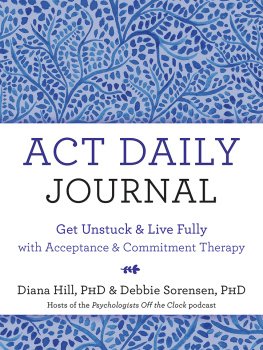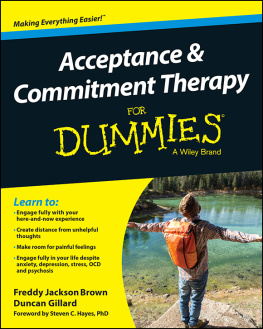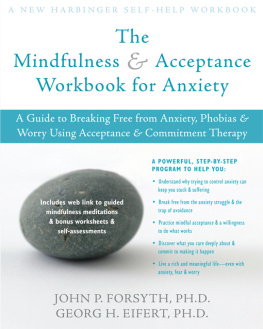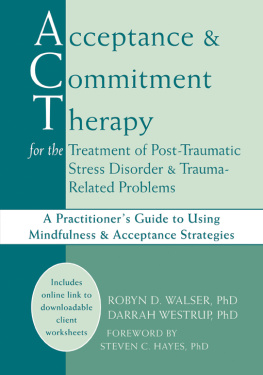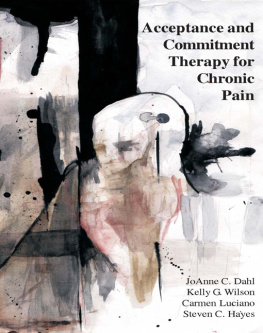Richard Bennett - Acceptance and Commitment Therapy
Here you can read online Richard Bennett - Acceptance and Commitment Therapy full text of the book (entire story) in english for free. Download pdf and epub, get meaning, cover and reviews about this ebook. publisher: Taylor & Francis (CAM), genre: Home and family. Description of the work, (preface) as well as reviews are available. Best literature library LitArk.com created for fans of good reading and offers a wide selection of genres:
Romance novel
Science fiction
Adventure
Detective
Science
History
Home and family
Prose
Art
Politics
Computer
Non-fiction
Religion
Business
Children
Humor
Choose a favorite category and find really read worthwhile books. Enjoy immersion in the world of imagination, feel the emotions of the characters or learn something new for yourself, make an fascinating discovery.

- Book:Acceptance and Commitment Therapy
- Author:
- Publisher:Taylor & Francis (CAM)
- Genre:
- Rating:5 / 5
- Favourites:Add to favourites
- Your mark:
- 100
- 1
- 2
- 3
- 4
- 5
Acceptance and Commitment Therapy: summary, description and annotation
We offer to read an annotation, description, summary or preface (depends on what the author of the book "Acceptance and Commitment Therapy" wrote himself). If you haven't found the necessary information about the book — write in the comments, we will try to find it.
Acceptance and Commitment Therapy — read online for free the complete book (whole text) full work
Below is the text of the book, divided by pages. System saving the place of the last page read, allows you to conveniently read the book "Acceptance and Commitment Therapy" online for free, without having to search again every time where you left off. Put a bookmark, and you can go to the page where you finished reading at any time.
Font size:
Interval:
Bookmark:

This book presents, in a clear and concise way, key concepts and techniques that make ACT what it is a humane and effective way of changing human behaviour to relieve distress and suffering, and to reorient individuals towards a future they want to have. The book is simple and honest in its aims to present a picture of what ACT looks like, of how it describes itself in its terminology, and of the science it connects most closely with. This combination is hugely workable and simply refreshing. The book grapples with the complexities of clinical problems, but manages to inspire the clinician not to be too daunted by this challenge, by offering a range of helpful, well-described tools that are usable, understandable and creative. I would definitely recommend this book for anyone interested in learning ACT or for clinicians wanting to explore ACT techniques.
Dr Yvonne Barnes-Holmes, Associate Professor in Behaviour Analysis, Department of Experimental-Clinical and Health Psychology, Ghent University, and leading researcher in Relational Frame Theory
In my opinion, this book deserves to be mentioned in the same breath as the classic ACT texts. I say this because I havent read a Contextual Behavioural Science book quite like this, where the depth of the science and practice is covered in such accessible language. It will be the first resource that I recommend to students who are interested in learning about this topic.
Dr Nic Hooper, Senior Lecturer at the University of the West of England, co-author of The Research Journey of ACT and co-creator of the annual Diary for Valued Action
This book will be essential reading for all trainee and qualified practitioners who want to use the wisdom of ACT ideas in their work. The book provides an accessible reference to the key theoretical concepts and practical issues for practitioners across all settings, such as individual or group psychotherapy, counselling, coaching, community or organisational interventions. The authors have cleverly kept the three important areas of learning the ACT approach central to the writing, that is, the Head (knowledge of theory and concepts), Hands (practical skills and techniques) and Heart (ways of relating to ones own experiences and the experiences of others). An excellent contribution from innovative authors in the field.
Dr Louise McHugh, Associate Professor, University College Dublin, and co-editor of The Self and Perspective Taking: Contributions and Applications from Modern Behavioral Science
A stand-out book: thorough, knowledgeable, clear and practical. It gives just the right balance of the necessary theoretical foundations, practical skills, and guidance on how to use them in context. The newcomer can work through it to learn what they need to do ACT well, rather than simply know about ACT. The veteran can open it at any page and find a new insight, technique, or idea to ponder. To be read cover-to-cover, or dipped into at random, this book is a valuable addition to the shelf of anyone interested in ACT.
Dr Ray Owen, Consultant Clinical Psychologist, Health Psychologist, and Peer Reviewed ACT Trainer, author of Facing the Storm and Living with the Enemy
Acceptance and Commitment Therapy
Acceptance and Commitment Therapy: 100 Key Points and Techniques offers a comprehensive, yet concise, overview of the central features of the philosophy, theory, and practical application of ACT. It explains and demonstrates the range of acceptance, mindfulness, and behaviour change strategies that can be used in the service of helping people increase their psychological flexibility and wellbeing.
Divided into three main parts, the book covers the Head, Hands, and Heart of the approach, moving from the basics of behavioural psychology, via the key principles of Relational Frame Theory and the Psychological Flexibility model, to a detailed description of how ACT is practised, providing the reader with a solid grounding from which to develop their delivery of ACT-consistent interventions. It concludes by addressing key decisions to make in practice and how best to attend to the therapeutic process.
The authors of Acceptance and Commitment Therapy bring a wealth of experience of using ACT in their own therapy practice and of training and supervising others in developing knowledge and skills in the approach. This book will appeal to practitioners looking to further their theoretical knowledge and hands-on skills and those seeking a useful reference for all aspects of their ACT practice.
Richard Bennett works as a Clinical Psychologist and Cognitive Behavioural Psychotherapist and runs a private practice, Think Psychology. He also leads a Postgraduate Diploma in Cognitive Behavioural Therapy as part of the Centre for Applied Psychology at the University of Birmingham.
Joseph E. Oliver is a Consultant Clinical Psychologist and director for Contextual Consulting, a consultancy based in London providing ACT training, coaching, and therapy. He is joint director for the University College London Cognitive Behavioural Therapy in Psychosis Post Graduate Diploma, whilst also holding a post within the NHS.
100 Key Points and Techniques
Series Editor: Windy Dryden
ALSO IN THIS SERIES:
Gestalt Therapy: 100 Key Points and Techniques
Dave Mann
Integrative Therapy: 100 Key Points and Techniques
Maria Gilbert and Vanja Orlans
Solution Focused Brief Therapy: 100 Key Points and Techniques
Harvey Ratner, Evan George and Chris Iveson
Cognitive Behaviour Therapy: 100 Key Points and Techniques, 2nd edition
Michael Neenan and Windy Dryden
Rational Emotive Behaviour Therapy: 100 Key Points and Techniques, 2nd edition
Windy Dryden and Michael Neenan
Existential Therapy: 100 Key Points and Techniques
Susan Iacovou and Karen Weixel-Dixon
Person-Centred Therapy: 100 Key Points and Techniques, 2nd Edition
Paul Wilkins
Single-Session Therapy (SST): 100 Key Points and Techniques
Windy Dryden
Acceptance and Commitment Therapy: 100 Key Points and Techniques
Richard Bennett and Joseph E. Oliver
Acceptance and Commitment Therapy
100 Key Points and Techniques
Richard Bennett and Joseph E. Oliver

First published 2019
by Routledge
2 Park Square, Milton Park, Abingdon, Oxon OX14 4RN
and by Routledge
52 Vanderbilt Avenue, New York, NY 10017
Routledge is an imprint of the Taylor & Francis Group, an informa business
2019 Richard Bennett and Joseph E. Oliver
The right of Richard Bennett and Joseph E. Oliver to be identified as authors of this work has been asserted by them in accordance with sections 77 and 78 of the Copyright, Designs and Patents Act 1988.
All rights reserved. No part of this book may be reprinted or reproduced or utilised in any form or by any electronic, mechanical, or other means, now known or hereafter invented, including photocopying and recording, or in any information storage or retrieval system, without permission in writing from the publishers.
Trademark notice: Product or corporate names may be trademarks or registered trademarks, and are used only for identification and explanation without intent to infringe.
British Library Cataloguing-in-Publication Data
A catalogue record for this book is available from the British Library
Library of Congress Cataloging-in-Publication Data
Font size:
Interval:
Bookmark:
Similar books «Acceptance and Commitment Therapy»
Look at similar books to Acceptance and Commitment Therapy. We have selected literature similar in name and meaning in the hope of providing readers with more options to find new, interesting, not yet read works.
Discussion, reviews of the book Acceptance and Commitment Therapy and just readers' own opinions. Leave your comments, write what you think about the work, its meaning or the main characters. Specify what exactly you liked and what you didn't like, and why you think so.



